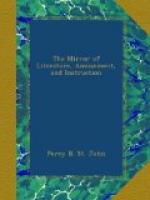and difficulties would be at an end. From that
moment his whole thoughts were directed to this object;
and in one of his works he has himself given us such
an account of the unconquerable zeal with which he
prosecuted his experiments, as it is impossible to
read without the deepest interest. For some time
he had little or nothing to expend upon the pursuit
which he had so much at heart; but at last he happened
to receive a considerable sum of money for a work which
he had finished, and this enabled him to commence
his researches. He spent the whole of his money,
however, without meeting with any success, and he was
now poorer than ever. Yet it was in vain that
his wife and friends besought him to relinquish what
they deemed his chimerical and ruinous project.
He borrowed more money, with which he repeated his
experiments; and, when he had no more fuel wherewith
to feed his furnaces, he cut down his chairs and tables
for that purpose. Still his success was inconsiderable.
He was now actually obliged to give a person, who had
assisted him, part of his clothes by way of remuneration,
having nothing else left; and, with his wife and children
starving before his eyes, and by their appearance
silently reproaching him as the cause of their sufferings,
he was at heart miserable enough. But he neither
despaired, nor suffered his friends to know what he
felt; persevering, in the midst of all his misery,
a gay demeanour, and losing no opportunity of renewing
his pursuit of the object which he all the while felt
confident he should one day accomplish. And at
last, after sixteen years of persevering exertion,
his efforts were crowned with complete success, and
his fortune was made. Palissy was, in all respects,
one of the most extraordinary men of his time; in
his moral character displaying a high-mindedness and
commanding energy altogether in harmony with the reach
and originality of conception by which his understanding
was distinguished. Although a Protestant, he
had escaped, through the royal favour, from the massacre
of St. Bartholomew; but, having been soon after shut
up in the Bastille, he was visited in his prison by
the king, who told him, that if he did not comply
with the established religion, he should be forced,
however unwillingly, to leave him in the hands of
his enemies. ‘Forced!’ replied Palissy,
’This is not to speak like a king; but they who
force you cannot force me; I can die!’ He never
regained his liberty, but ended his life in the Bastille,
in the ninetieth year of his age.”
* * * * *
OLD POETS.
LOVE.
What thing is Love, which naught can countervail?
Naught save itself, ev’n
such a thing is Love.
And worldly wealth in worth as far doth
fail,
As lowest earth doth yield
to heav’n above.
Divine is love, and scorneth worldly pelf,
And can be bought with nothing but with
self.




